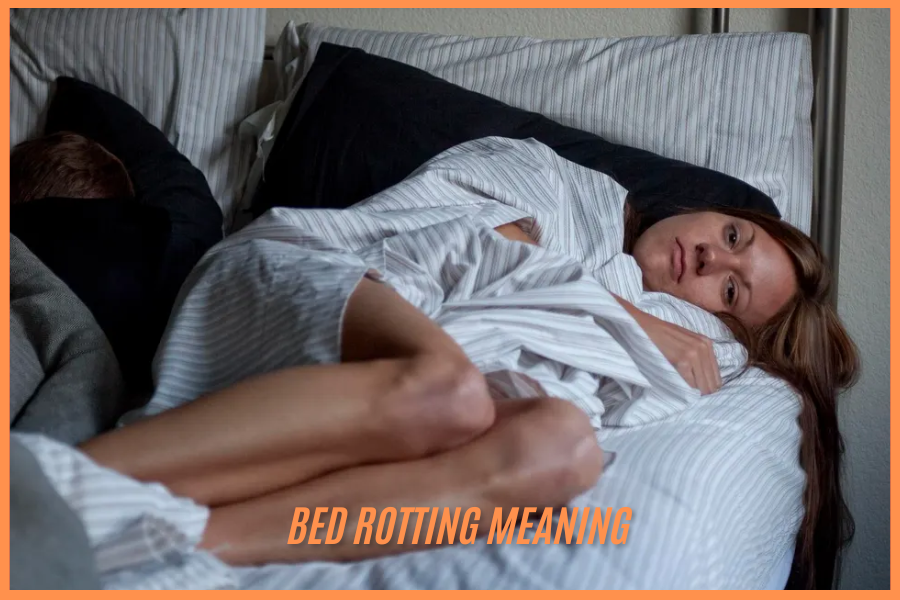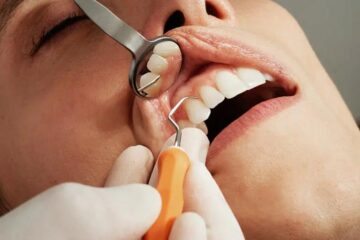In a world where hustle culture dominates, there’s a new trend that’s gaining attention, particularly among younger generations. Known as “bed rotting,” this phenomenon has become a talking point in the realm of self-care, but it’s more than just a casual trend. Bed Rotting Meaning is not just about lying in bed all day; it’s a form of rest that some have come to view as an escape from the pressures of everyday life. In this article, we will explore the concept of Bed Rotting Meaning, the reasons people engage in it, the benefits, and the potential risks involved in this modern-day practice.
What Exactly Is Bed Rotting?
At its core, “Bed Rotting Meaning” refers to spending an extended amount of time in bed, often for an entire day or more, without engaging in any productive tasks or responsibilities. The term gained traction in online communities, especially on social media platforms like TikTok, where it became associated with taking a break from work or academic stress, as well as the pressures of modern life.
However, bed rotting isn’t simply about lying in bed aimlessly; it can involve watching television, scrolling through social media, playing games, reading, or just lying down with no specific agenda. The key element of bed rotting is the focus on rest and relaxation, giving individuals permission to step away from the never-ending to-do list.
While it may sound like a simple act, bed rotting taps into the desire to disconnect from the stress of productivity culture, where there is constant pressure to do more, be more, and achieve more. The practice can become a way of recharging, rejuvenating, and even resisting societal expectations of constant productivity.
Wiki
| Term | Bed Rotting |
| Bed Rotting Meaning | The act of spending extended periods of time in bed, often for an entire day or more, to relax or escape from stress, burnout, or overwhelming responsibilities. |
| Origin | The term gained popularity on social media platforms like TikTok, where it became associated with self-care and mental health breaks. |
| Primary Activities | Relaxing, watching TV, scrolling through social media, reading, or simply lying down without engaging in productive activities. |
| Target Audience | Primarily younger individuals, especially those experiencing stress, burnout, or pressure from work, school, or social obligations. |
| Potential Benefits | Stress relief, mental health reset, physical recovery, and a digital detox from constant connectivity. |
| Risks | Physical health concerns (e.g., muscle weakness, poor circulation, joint pain), mental health issues (e.g., isolation, negative thought patterns), and disrupted sleep patterns. |
| Mental Health Impact | Can help relieve stress and burnout but may exacerbate feelings of loneliness or depression if overdone. |
| Physical Health Impact | Potential for negative consequences such as poor posture, muscle stiffness, weight gain, and circulation issues if done excessively. |
| How to Practice Mindfully | Limit the time spent in bed, engage in light movement or stretching, stay connected socially, and maintain a balance between rest and productivity. |
| Popular Platforms | TikTok, Instagram, and other social media platforms where users share experiences and insights into their bed rotting habits. |
The Rise of Bed Rotting on Social Media
In recent years, social media platforms like TikTok have played a significant role in spreading the concept of bed rotting. What started as a niche trend quickly gained traction among younger users who began to see it as a form of self-care, a way to prioritize their mental and physical health over the demands of society.
The hashtag #bedrotting amassed millions of views as users shared their experiences of spending entire days in bed. Many found it comforting, especially in the aftermath of stressful situations, mental health struggles, or overwhelming work or school obligations. Videos and posts showcasing individuals indulging in this practice were often accompanied by messages of self-compassion and a sense of relief from burnout.
What was once considered a minor act of laziness or procrastination has now been reframed as a form of self-care. However, while the trend is popular, it’s essential to understand both the potential benefits and the risks that come with indulging in bed rotting for extended periods.
The Psychological Benefits of Bed Rotting
While bed rotting may seem like a simple act of idleness, there are several psychological benefits associated with it when practiced in moderation. Below are some of the advantages of taking time to rest in bed:
Stress Relief
One of the most significant benefits of bed rotting is stress relief. Modern life is filled with constant pressure, whether it’s from work, school, family obligations, or other external factors. Taking a break and spending the day in bed can serve as a much-needed respite from these stressors. In a world that prioritizes busyness, doing absolutely nothing for a while can help calm the mind and allow individuals to regroup and recharge.
Mental Health Reset
Mental health is another area that can benefit from bed rotting. For people dealing with burnout, anxiety, or depression, sometimes the best solution is to rest and allow themselves time away from the overwhelming demands of daily life. The practice offers a temporary mental break, helping individuals distance themselves from triggers that may worsen their mental health conditions.
Additionally, taking time for oneself can encourage feelings of self-compassion. People often forget to practice self-care because they feel guilty about not being productive. Bed rotting can break that cycle of guilt, allowing individuals to embrace the idea that rest is just as important as work.
Physical Rest and Recovery
In certain circumstances, bed rotting can serve as a form of physical rest. People who are physically ill or recovering from surgery may find it necessary to spend time in bed as a means of healing. During recovery, the body needs time to restore its energy levels, and lying in bed can promote a better recovery rate.
Even without illness, for those who feel exhausted after prolonged physical activity or work, bed rotting offers the opportunity for the body to relax. It can give muscles time to recover and help reduce physical fatigue.
Disconnecting from Digital Life
While social media and screens play a large part in the concept of bed rotting, spending time away from the constant barrage of digital information can have its benefits as well. Constant connectivity can leave individuals feeling overwhelmed, stressed, or distracted. Taking a day to disconnect and unwind in bed can provide a necessary digital detox, allowing people to step away from the noise and focus on themselves.
The Risks of Bed Rotting: When Too Much Rest Becomes Harmful
Although bed rotting can provide a temporary sense of relief and well-being, excessive time spent in bed can lead to various risks. Like everything in life, moderation is key. Let’s look at the potential downsides of prolonged bed rest.
Physical Health Concerns
One of the most significant risks associated with extended periods of bed rotting is the impact on physical health. Spending too much time in bed can lead to a decrease in physical activity, which in turn can cause a range of health issues. The human body is designed to move, and when we stay in one position for long periods, it can lead to issues such as muscle weakness, poor circulation, and even weight gain.
Lack of movement can also affect posture and joint health. People who spend entire days in bed without shifting their positions might experience back pain, muscle stiffness, or a decline in overall flexibility. Prolonged immobility can even increase the risk of deep vein thrombosis (DVT), a condition in which blood clots form in veins, often due to inactivity.
Mental Health Impact of Isolation
Although bed rotting can be beneficial for mental health, it can also have an adverse effect when practiced excessively. Social isolation is a common issue that arises when someone spends too much time in bed. Disconnecting from social interactions for extended periods may lead to feelings of loneliness or exacerbate symptoms of depression and anxiety.
Moreover, staying in bed for too long without engaging in any purposeful activity can make people feel disconnected from their goals and aspirations. The lack of routine can increase feelings of helplessness, as individuals may struggle to feel productive or motivated. This can spiral into negative thought patterns that worsen mental health over time.
Disrupted Sleep Patterns
Another risk associated with bed rotting is the disruption of sleep patterns. While it may seem like staying in bed all day would lead to better sleep at night, it can actually have the opposite effect. Too much daytime rest can mess with your body’s internal clock, making it harder to fall asleep at night.
The body naturally follows a circadian rhythm, which helps regulate sleep-wake cycles. When someone spends too much time in bed during the day, they might find themselves tossing and turning at night. This disruption can lead to poor sleep quality, insomnia, or irregular sleep patterns that further affect overall health.
Finding Balance: How to Practice Bed Rotting Mindfully
While there are benefits to bed rotting, it’s essential to strike a balance. Here are some tips for practicing it in a healthy, mindful way:
Set Boundaries
The key to practicing bed rotting in a healthy way is moderation. It’s important to set limits on how much time you spend in bed each day. Allow yourself a full day of rest when needed, but try not to make it a regular habit.
Get Moving
Even if you’re taking a day to rest, make sure to include some movement in your day. Stretching, light walking, or even yoga can help you avoid the negative health consequences of extended immobility.
Stay Connected
Take care to stay socially connected. While it’s okay to retreat into bed for some personal time, don’t isolate yourself for too long. Regular communication with friends or family members can help prevent loneliness.
Maintain a Routine
Having a daily routine can help you balance rest with productivity. Structure your day so that you can engage in activities outside of your bed while still allowing yourself time to unwind. A balance of work, social interaction, and rest is key to maintaining a healthy lifestyle.
The Bottom Line: Is Bed Rotting Meaning Healthy or Harmful?
In conclusion, bed rotting is a trend that taps into the need for rest and self-care in a fast-paced world. While it can provide psychological and physical benefits when done in moderation, it also carries risks if practiced excessively. Balancing rest with productivity, physical activity, and social engagement is essential to ensure that bed rotting doesn’t lead to negative consequences for your health.
As with most trends, the key to making it work for you is to be mindful and listen to your body. Take the time you need to rest, but don’t let it interfere with your overall well-being. The goal is to find a balance that helps you feel rejuvenated, rather than stuck in a cycle of inactivity.
Conclusion
In today’s fast-paced world, the concept of “bed rotting” has emerged as a form of rest, providing a temporary escape from the pressures of modern life. It’s a trend that encourages individuals to take time off from their hectic routines to unwind, relax, and reconnect with themselves. However, while Bed Rotting Meaning can offer much-needed mental and physical relaxation, it’s essential to approach it with moderation. Spending too much time in bed can lead to physical health concerns, mental health challenges, and disrupted sleep patterns.
To fully benefit from bed rotting, it’s crucial to practice it mindfully—setting boundaries, engaging in occasional physical activity, maintaining social connections, and balancing rest with productivity. Ultimately, bed rotting, when done in a healthy and intentional way, can be a valuable tool for self-care, helping individuals recharge and reset, but should always be practiced with balance in mind.
Frequently Asked Questions (FAQs)
What is bed rotting?
Bed rotting refers to the act of spending extended periods of time in bed, often for a full day or more, with no intention of being productive. It typically involves relaxing activities like watching TV, scrolling through social media, reading, or simply resting, with the purpose of disconnecting from stress or burnout.
Is bed rotting good for mental health?
When practiced in moderation, bed rotting can have mental health benefits. It allows individuals to take a break from the pressures of daily life, reducing stress and providing time for relaxation. It can also offer a mental reset, especially for those dealing with burnout or anxiety. However, excessive bed rotting may lead to isolation and negative thought patterns.
How can bed rotting affect your physical health?
Spending too much time in bed can lead to physical health issues such as muscle weakness, poor circulation, joint pain, and even weight gain. Prolonged inactivity can also disrupt sleep patterns and affect posture, so it’s important to balance bed rest with physical activity.
Can bed rotting improve sleep?
While some people may find that resting in bed helps them unwind, too much daytime rest can interfere with sleep quality. It can disrupt your body’s natural circadian rhythm, making it harder to fall asleep at night. Maintaining a healthy routine with limited bed rotting can promote better sleep.
How do I practice bed rotting mindfully?
To practice bed rotting mindfully, set limits on how much time you spend in bed, get up and move around to avoid physical stagnation, stay connected with friends and family to prevent isolation, and maintain a daily routine that includes productive tasks alongside rest. Strive for a balance of relaxation and activity to ensure both mental and physical health.
Is bed rotting a form of self-care?
Yes, bed rotting can be a form of self-care when used as a way to recharge and reset. It allows you to take a break from daily stresses and responsibilities. However, it should not be used as an excuse for excessive laziness or to avoid addressing underlying issues that may be contributing to stress or burnout.
How long should I practice bed rotting?
The duration of bed rotting varies from person to person. For some, taking a full day of rest may be beneficial, while others may prefer shorter breaks throughout the week. It’s important to listen to your body and avoid overindulgence, as spending too much time in bed can have negative consequences for both mental and physical health.
Unlock the latest news and updates on Magazine Format




